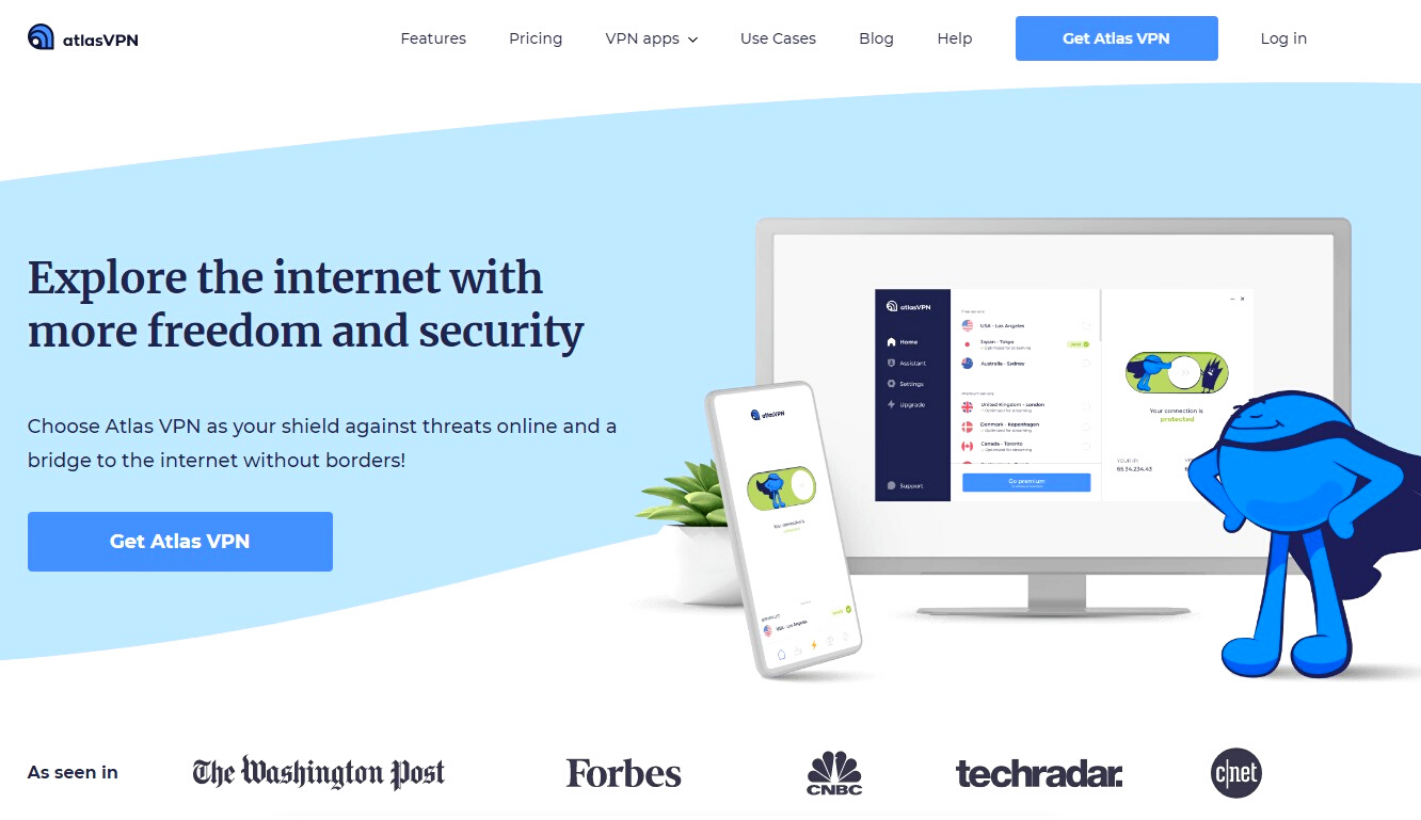Review Atlas VPN
Unlimited access to servers worldwide. Super fast speed. Enjoy the best deal with our link…

Summary
Atlas VPN only launched in January 2020, but it’s already making waves among many VPN users. It’s billed as a free VPN service that respects your privacy, doesn’t bombard you with ads, has no data caps, and uses military-grade encryption. In short, it’s everything most other “free” VPN brands don’t do, which is honestly pretty cool. Of course, if you want access to faster, optimized servers, Atlas VPN also offers a premium version.
This VPN provider is also growing very quickly with over 570 servers in 17 countries in just one year of operation. Connections are fast, reliable and secure with IPv6 protocol, DNS leak protection and WebRTC. The apps are compatible with Windows, macOS, Android, iOS and soon Chrome.
What we like even more about this service is that it collects very little data. In fact, if you use the free version, you don’t even need to sign up! So far, so good, but let’s see if this service is really as remarkable as it claims to be.
Privacy / Anonymity
Atlas VPN uses a standard combination of AES-256 and IPSec/IKEv2 to secure its web traffic. This makes it virtually unhackable, and you won’t have to worry about hackers getting their hands on your information. As for Atlas VPN itself, how much of your data is stored? According to their privacy policy:
“We are a zero-logging VPN: we do not store any information that identifies your online activities through this VPN connection. The only information collected is basic analytics data, in order to ensure a quality service to all our users. This also means that we do not have any data to share with government agencies and law enforcement agencies that make requests for information about what you were doing through a VPN connection.”
Well, this is very reassuring especially since Atlas VPN relies on the “5 Eyes” agreement. With this data logging policy, they will not have any data to hand over to governments or law enforcement. Moreover, Atlas VPN also has a Kill Switch to protect you from data leaks in case of a connection failure. Another handy feature is the SafeBrowse feature that warns you when you are about to open a malicious or potentially dangerous website. However, at the time of writing, the Kill Switch and SafeBrowse features are only available on the Android and iOS apps.
Speed and reliability
In order to test the speed and reliability of Atlas VPN, we used it for several weeks not only for downloading, but also for online gaming and normal browsing. Before connecting to a server, we usually had an average download speed of 49 Mbps and an upload speed of 7 Mbps. We noticed almost no difference when we connected to a local server, as our download speed remained stable, averaging 41 Mbps, and the upload speed hovered around 4 Mbps. As expected, the speeds dropped slightly as soon as we switched to a server in the US (we were somewhere in Europe at the time of this test). The base download speed of 49 Mbps dropped to around 37 Mbps, while the upload speed dropped to 3 Mbps. Overall, our experience was more than satisfactory. Note, however, that the speed tests were conducted with a Premium account.
Platforms and devices
Atlas VPN is compatible with your mobile phone, tablets, laptops, and desktops and supports a number of platforms including Android, iOS, macOS, and Windows. Atlas VPN does not currently work on OSX clients.
Server Locations
Currently, Atlas VPN has a total of 573 servers in 17 countries: Australia, Austria, Belgium, Canada, Denmark, France, Germany, Ireland, Italy, Netherlands, Norway, Singapore, Spain, Sweden, Switzerland, United Kingdom and United States.



























Customer service
Atlas VPN has a comprehensive FAQ section under the HELP tab. The articles aren’t well organized but we liked the search bar to find what we needed. If that fails, you can always email them at support@atlasvpn.com. If you’re a Premium subscriber, just log in and you’ll get personalized customer support 24/7.
Prices
For context, let’s first cover the differences between the free and paid plans. The free plan essentially gives you unlimited bandwidth, encryption, and data encapsulation, as well as limited access to just three countries: the United States, Japan, and Australia. In contrast, here’s everything you can get with a premium plan:
• 20+ locations worldwide and 500+ servers
• 24/7 personalized support
• Simultaneous use of premium services on unlimited devices
• SafeBrowse feature and security check
• Faster performance and unlimited bandwidth
Now that that’s out of the way, let’s talk about pricing. The monthly cost of €8.99 isn’t exactly competitive, considering that the average monthly fee for a VPN service is around €4. The price, however, drops significantly if you subscribe annually to €1.99 per month, and it drops further to €0.99 per month if you pay upfront for 3 years. While this isn’t exactly the lowest price on the market, it’s worth noting that Atlas VPN doesn’t impose any limits on the number of devices connected to a premium account. This means you don’t need to purchase an additional subscription to cover all the devices in your household!